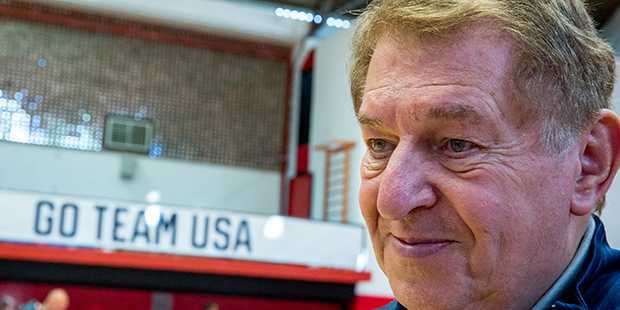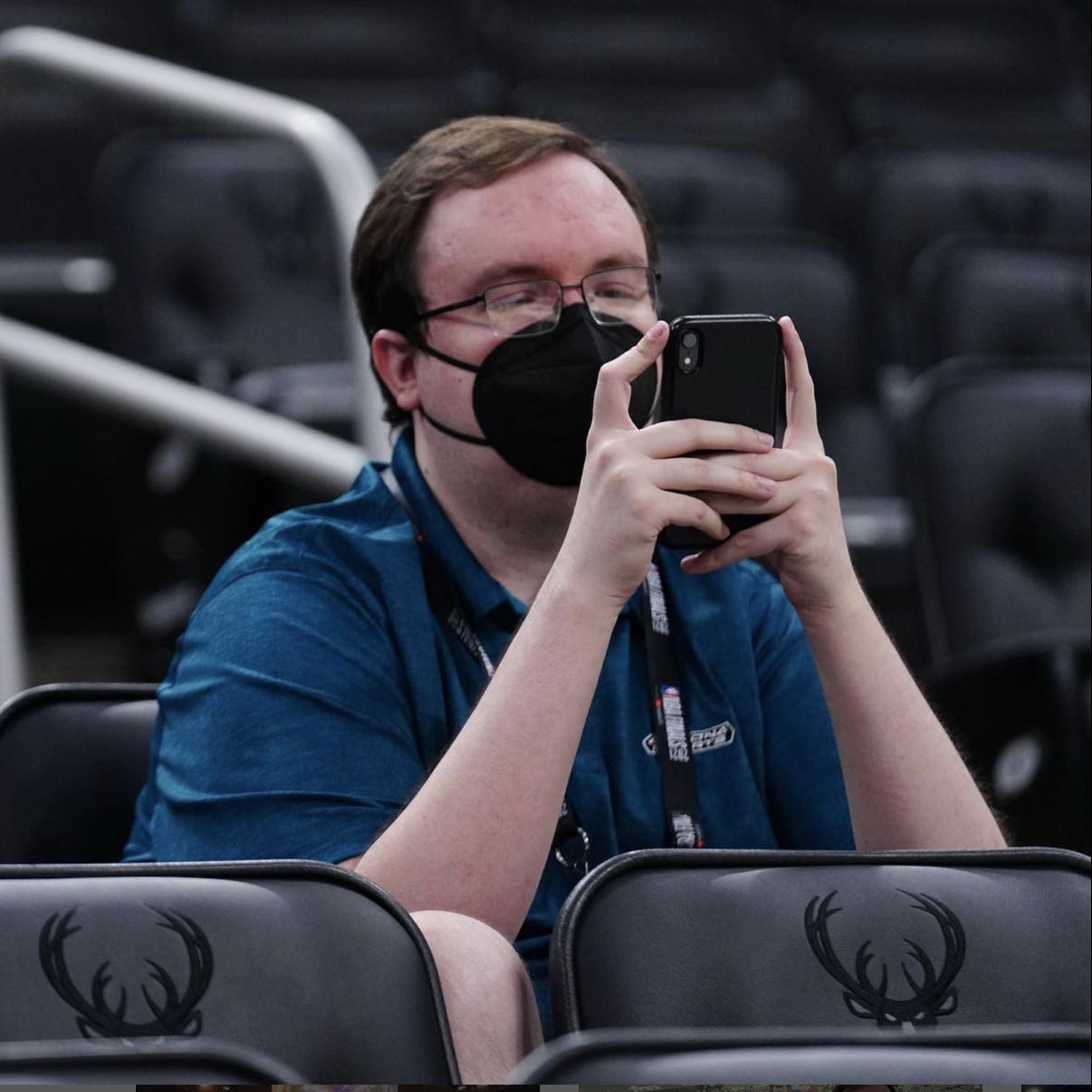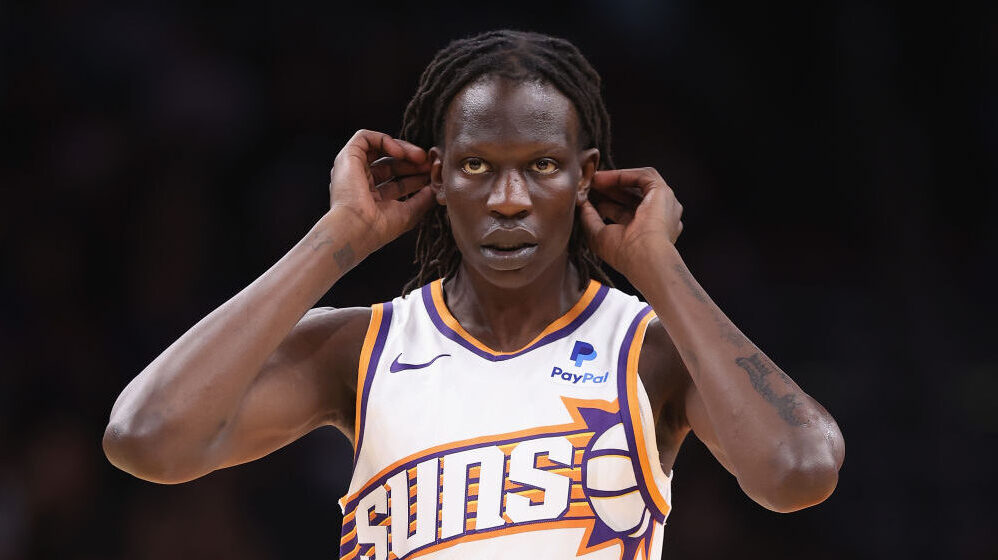How Jerry Colangelo reinvigorated USA Basketball
Aug 19, 2016, 11:37 AM

USA men's Olympic basketball managing director Jerry Colangelo answers questions before practice at the Flamengo Club in Rio de Janeiro on Thursday, Aug. 11, 2016.
RIO DE JANEIRO — Jerry Colangelo stepped off the USA men’s basketball team bus and into the Flamengo Club practice facility a couple blocks off the Atlantic Ocean in Rio de Janeiro. He walked in before any of his hand-selected players. Donning a Team USA jacket and a gold Olympic ring on his right hand, the managing director of USA Basketball stood on the sidelines as the most dominant basketball team in the world practiced its craft.
“He’s like the godfather,” said former NBA MVP Kevin Durant.
Undefeated in 22 Olympic games since Colangelo took over. Only one loss in 82 international contests. Colangelo’s team has been nearly invincible since he took over operations in April 2005, and it would take an enormous upset for them to get knocked out at the Rio Games, despite recent struggles.
“He is the team,” said DeMar DeRozan, a first-time Olympian and two-time NBA All-Star on the Toronto Raptors. “He put this whole thing together. He orchestrated USA Basketball to be great.”
Before Colangelo was hired, though, the U.S. was beatable.
“We needed to change the culture,” Colangelo said. “We needed to show the world, the basketball community, respect, because we had lost our standing.”
The selection committee
The day was June 22, 2004. Marc Stein of ESPN had just reported that 20-year-old Carmelo Anthony, who had recently finished his rookie campaign, would play for Team USA. The Olympics were less than two months away, and Anthony would join players including fellow rookies LeBron James, Dwyane Wade and second-year player Amar’e Stoudemire on the court to replace the nine athletes who had dropped out, including Olympic veterans Ray Allen, Jason Kidd and Vince Carter.
“In the past they would pick kind of an All-Star team at the last second and they would represent the United States,” Colangelo said.
The “All-Star team” approach began in 1992, the first Olympics in which NBA players were allowed to compete in international events. FIBA Secretary-General Boris Stankovic brought up a motion that said that allowing other countries’ professional athletes to play, but not NBA players, was unfair, and that putting them in the games would help the sport grow globally. The vote passed and the U.S. team changed from college players to primarily NBA athletes.
Members of the U.S. selection committee voted in who they thought would be the best players for the team. They scrutinized players’ performances over the previous two NBA seasons, and then created the team based off of those evaluations. In the first year, it worked marvelously, putting together what is widely considered the greatest group of basketball talent ever assembled. The “Dream Team,” made up of 11 future Hall of Fame members, including Charles Barkley, Michael Jordan, Magic Johnson and Larry Bird, dominated the 1992 Barcelona Olympics, outscoring opponents by 44 points per game.
The U.S. went undefeated through the 2000 Olympics in Sydney, but the final scores were closer than in 1992. The selection committee would choose the Olympic trials team, and the first nine were guaranteed spots on the Olympic team. The next year, the remaining spots were filled based on how players performed during the NBA season.
In 2004, only three players from the 2003 international roster — Tim Duncan, Allen Iverson and Richard Jefferson — remained on the team. Most of the vacancies were filled in spring 2004 — only a few months before the Olympics began.
The players on that 2004 team in Athens, who didn’t have much experience playing together, lost by 19 to Puerto Rico to open the tournament, then later fell by four to Lithuania. The U.S. lost to Argentina in the semifinals.
It was the first time since NBA players had become eligible to compete that Team USA didn’t win gold. It took bronze instead.
“We weren’t the champions of the world,” Anthony said. “We were third place. That feeling was a terrible feeling.”
It wasn’t the first time the U.S. struggled in international play. In the FIBA World Championships that occur two years before every Olympics, the U.S. struggled. From when the the tournament began in 1978 to when Colangelo took over in 2005, the U.S. had only two golds, one silver and two bronze medals.
Twice — in 1978 and 2002 — it didn’t even medal.
No, 2004 was not the first time the U.S. men’s basketball team struggled. It was just the final straw.
“There were some devastating losses in 2002 and then 2004 in Athens, it just kind of culminated with a bad showing and people in charge recognized that there needed to be some change,” Colangelo said.
Creating a culture
In April 2005, Colangelo took over Team USA. He was best known as the father of professional sports in Phoenix.
In 1968, Colangelo was named the first general manager of the Phoenix Suns, and the next year, took over for a brief stint as head coach and led the team to its first playoff berth in only its second year in existence. After a drug scandal rocked the franchise, Colangelo put together an investment group to purchase the Suns in 1987 and spearheaded the construction of a new arena in downtown, which opened in 1992. The Suns advanced to the NBA Finals in 1976 and again in 1993 under Colangelo’s leadership. He sold the team in 2004 but remained as CEO for three years and chairman for another five. In all, he spent 44 years with the franchise.
He also played a key role in the move of the Winnipeg Jets to the Valley in 1996, transforming the hockey team into what is now known as the Arizona Coyotes.
On the baseball side, MLB granted Colangelo’s ownership group an expansion franchise in 1994. The Arizona Diamondbacks began play in 1998. Again, Colangelo’s sports team saw success immediately; in its fourth year as a team, the Diamondbacks defeated the Yankees in the World Series.
His partnership with the Diamondbacks ended in 2004 after a dispute with his ownership partners.
“It was perfect timing for me and maybe it was perfect timing for USA Basketball,” he said.
It was time to create a culture.
With complete autonomy of the team, his first step was to hire a coach who could instill a proper mindset in the world’s most dominant players. Someone who knew the team well. Duke coach Mike Krzyzewski, who had been around the program in different capacities for 27 years, including assistant coach on the 1992 “Dream Team” and head coach of several different non-Olympic international U.S. teams, fit the bill.
In Coach K’s 25 years leading the Blue Devils up to that point, he had led his team to 10 Final Four appearances and three national championships.
“I was proud to be asked and just as proud to accept,” Krzyzewski said.
After hiring Coach K, Colangelo’s next big step involved dismantling the selection committee. He would have sole authority in choosing the players. He gathered a deep pool of talent from which he could build a roster, making it easier to choose replacements if players dropped out prior to the Olympics. This depth chart now consists of 42 players, and helped the team when players such as LeBron James, Stephen Curry and Kawhi Leonard declined invitations to go to Rio.
“It was run by a committee before and run badly,” said Team USA assistant coach and Syracuse head coach Jim Boeheim. “It showed that you need one guy in charge to pick the coaches, to pick the players and to be the overall guiding force.”
To create such a large pool of talent from which he could draw, Colangelo had to convince players that international competition required a strong commitment and would not be a cakewalk to gold.
He looked for more than an all-star cast. In 2004, one year before he took over, there was only one true point guard on the team. There were few three-point specialists. There were no commitments by players from that team to come back for the next round of international play, in 2006.
“I asked players for three-year commitments to get the ball rolling,” he said. “Once players bought in, it started to snowball in a very positive way because players talk to one another and because we had success.”
After completing a grueling NBA regular season and in many cases a playoff run, players had to be willing to dedicate themselves to another playoff-like tournament for a potential three consecutive years on Colangelo’s team.
Take Durant, for instance. According to Basketball Reference, he has played about 28,000 minutes combined across the regular season and postseason in his nine NBA seasons. In the four years between the 2008 Beijing Olympics and 2012 London games, he played more than 14,000 minutes total in the NBA. A key to Colangelo’s success is his ability to convince players like Durant that representing their country is important enough to devote the offseason to it.
His 36 years of experience with the Suns helped him create a reputation around the league in which players trusted his judgment.
“He’s been around the game of basketball and seen the greatest players throughout his day,” Durant said. “It’s pretty cool to just have him walking around and seeing his presence, just knowing how much he knows about the game of basketball.”
Colangelo said that people’s trust in him comes from the personal connections he has made during a lifetime spent in basketball.
“Life is relational,” he said, “so when you develop relationships within an industry and there is a trust factor, people trust you and your judgment and the players understand that.”
In 2006, Wade, James and Anthony geared up for the FIBA tournament, hoping to avenge their Olympic loss two years earlier. For the first time, Colangelo’s hand-picked team would take the floor for international play.
The U.S. still lost. It finished in third place yet again. It was a tough loss, but it provides a cautionary tale 10 years later to a U.S. team in Rio that hasn’t played at the level expected of them over the last decade.
“We’re going to get back to 2000 to 2006 where we’re arrogant, we don’t give people credit, we think it’s all going to be easy and that we’re not going to play well,” Krzyzewski said. “And we’re not going to win.”
Team USA has, for the most part, kept out of that mindset since 2006. That bronze medal finish is the team’s only loss since Colangelo took over.
Dominating the international field
In 2008, Chris Paul, Deron Williams and Jason Kidd manned the point guard position. Kobe Bryant joined the team as a captain, and James, Wade and Anthony got another chance to get retribution for 2004.
They went 5-0, avenging their 2004 loss to Argentina by defeating the country by 20 in the semifinals and then beating Spain by 11 to win the gold medal.
“(Colangelo’s) the main reason why we are who we are as a team, as a country,” Anthony said. “He established this foundation, he created this foundation. He created this culture that we have for USA Basketball, and we are benefitting from that right now.”
In 2010, the United States won the FIBA World Championships for the first time since the 1994 squad that was led by Michael Jordan and Magic Johnson. This gave the U.S. automatic entry into the 2012 Olympics in London. The team looked as strong as ever, drawing comparisons to the “Dream Team.”
For the second time in a row, the U.S. went 8-0 and walked away with gold. The transformation was complete.
2016 and beyond
Now it’s 2016, and Team USA has experienced challenges unlike anything they’ve faced since 2006. Several players dropped out— only Anthony and Durant remain from the 2012 team — mainly citing fatigue or injury. Until the 27-point victory over Argentina on Wednesday, the team did not display the dominance it had shown in each of the Olympics since Colangelo took over; Australia led at halftime on August 10; Serbia came back from 18 points down in the first half to force a close contest Friday. Two days later, the U.S. only defeated France by three.
Krzyzewski said the team cannot grow arrogant and complacent like in the past.
“We can’t fall into that, even though having won a number of times, people want to get back into doing that and that’s not where we’re going,” he said. “We’re not going to lose site of the road that we have to be on.”
If the blowout win over Argentina is any indication, the team will stay on that road with Colangelo at the helm. DeMar DeRozan, who was drafted to the Toronto Raptors by Colangelo’s son Bryan, has been around the family since 2009.
“I learned a lot from his son and getting a chance to meet him,” DeRozan said. “Learning discipline. Just having that winning mindset. It’s something that definitely rubs off.”
Rio 2016 won’t be Colangelo’s final Olympics. He said the decision to join the team in 2005 took him about “about 30 seconds” and he’s not quite ready to leave. When he hired Gregg Popovich in October to replace Krzyzewski for the next Olympic cycle, Coach Pop said he’d only coach if Colangelo hung around.
In Colangelo’s words, “that was an easy decision.”
Once Tokyo 2020 rolls around, Colangelo will be 80 years old. If he decides to hang up his USA jacket following those games, it could be the conclusion to the career of one of the greatest minds in Phoenix sports history.
“To create an atmosphere for players, that was always one of the keys to our success with the franchises in Phoenix,” Colangelo said. “And it’s no different here with USA basketball.”
Krzyzewski said Colangelo has changed the sport at “all levels” in the United States.
“We didn’t have a culture for USA basketball and he’s made it into a really good business too,” Krzyzewski said. “It’s really spectacular what he’s done. Nobody else could’ve done it and I’m thankful that I’ve been a part of it and being with him on that journey.”


